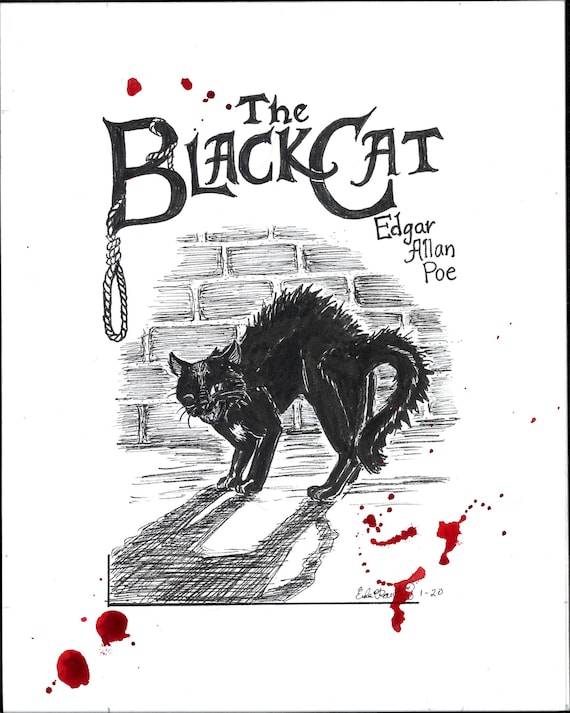Edgar Allan Poe, renowned for his macabre and mysterious tales, has left an indelible mark on literature. However, few delve into the tumultuous events that shaped his haunting narratives. Poe’s tragic childhood experiences play a pivotal role in his dark writings, with the loss of his parents at a young age and the unstable relationships he endured leaving profound scars on his psyche. These early traumas manifest in his works, infusing them with themes of loss, grief, and isolation. By exploring the depths of Poe’s past, we can uncover the roots of his morbid imagination and gain a deeper understanding of the man behind the chilling tales that continue to captivate readers to this day.
Introduction: Exploring the Life of Edgar Allan Poe
Edgar Allan Poe, the master of macabre and mystery, is renowned for his chilling tales that continue to captivate audiences today. Born in 1809, Poe’s life was marked by tragedy and darkness, setting the stage for his haunting literary works.
Poe’s Early Life and Influences
Throughout his childhood, Poe experienced a series of devastating events that would shape his writing. His father abandoned the family, and his mother passed away when he was just two years old, leaving him in the care of John Allan, a wealthy merchant from Virginia.
The Impact of Loss and Abandonment
Poe’s early encounters with loss and abandonment instilled a sense of melancholy and despair in his writing. These traumatic experiences haunted him throughout his life, driving him to explore themes of death, madness, and the supernatural in his works.

Early Life and Family Background
Edgar Allan Poe, born in 1809, faced tragic events that influenced his dark tales. His parents, actors Elizabeth and David Poe Jr., died when he was young, leading to his adoption by John and Frances Allan.
Loss of Parents
Poe’s father abandoned the family, and his mother passed away when he was just two years old. These losses profoundly impacted his psyche and themes in his writings.
He often experienced feelings of isolation and abandonment.
Adoption by the Allans
Following his mother’s death, Poe was taken in by the wealthy John and Frances Allan of Richmond, Virginia. This transition from poverty to privilege influenced his perspective on social class and status.
- Living with the Allans exposed Poe to education and manners that shaped his future.
Loss and Tragedy: Impact on Poe’s Writing
Edgar Allan Poe, a master of macabre fiction, was profoundly influenced by the tragic events of his childhood. With both his parents having passed away by the time he was three years old, Poe faced immense loss and abandonment, shaping his writing with themes of death, grief, and darkness.
Surviving Orphanhood and Its Effects
Forced to navigate the harsh realities of orphanhood, Poe’s early years were marked by feelings of solitude and alienation. This isolation manifested in his works, portraying characters haunted by their own sense of abandonment and loss.
Additionally, the trauma of losing loved ones at a young age left a lasting impact on Poe’s psyche, leading him to explore the depths of human suffering and despair in his tales.
The Influence of Personal Tragedies
Poe’s writing often delved into the themes of premature burial, insanity, and death, reflecting his own experiences with the untimely demise of those dear to him. His works’ dark and foreboding atmospheres were, in part, a reflection of the tragedies he endured.
- Stories like “The Tell-Tale Heart” and “The Raven” demonstrate Poe’s deep exploration of the psychological impacts of loss and tragedy.

Relationship with Death and Grief
Edgar Allan Poe’s profound exploration of death and grief in his literary works can be attributed to the series of tragic events that marred his childhood.
Impact of Early Loss
Poe’s emotionally turbulent childhood, marked by the early deaths of his parents, deeply influenced his perception of mortality and sorrow.
His mother’s death due to consumption and his father’s abandonment left an indelible mark on his psyche.
Themes of Death in Literature
Poe’s recurrent theme of premature burials and macabre deaths reflects his personal encounters with loss and the fear of mortality.
- He delved into the psychological impact of death in works such as “The Tell-Tale Heart” and “The Raven”.
- His haunting depictions of grief and mourning resonate with readers worldwide.
Influential Figures in Poe’s Life
Edgar Allan Poe’s dark tales were profoundly influenced by the tragic events in his childhood. Several key figures played significant roles in shaping Poe’s literary journey:
John Allan – Poe’s Foster Father
John Allan, Poe’s foster father, had a tumultuous relationship with Poe. After the death of Poe’s parents, Allan took him in but their relationship soured over time, leading to Poe’s sense of abandonment that often reflected in his works.
Virginia Clemm – Poe’s Wife and Cousin
Virginia Clemm, Poe’s wife and cousin, was a significant influence on his writing. Her early death at a young age deeply impacted Poe, contributing to the themes of love, loss, and mourning in his works.
Elmira Royster – Poe’s Lost Love
Elmira Royster was Poe’s childhood sweetheart who reentered his life later on. Poe’s unrequited love for Elmira and their separation had a lasting effect on his poetry, infusing it with themes of longing and unattainable desires.

Exploring Poe’s Darkest Tales: Themes of Isolation and Madness
Edgar Allan Poe, a master of macabre storytelling, was heavily influenced by tragic events during his early life. This led to the recurring themes of isolation and madness in his works, reflecting his own struggles with grief and despair.
The Influence of Poe’s Childhood Trauma
Poe’s father abandoned the family, and his mother passed away when he was just two years old. These early losses left him feeling isolated and vulnerable, themes that are prevalent in his tales of horror and despair.
The Manifestation of Isolation in Poe’s Works
In stories such as “The Tell-Tale Heart” and “The Fall of the House of Usher,” Poe delves deep into the psyche of characters who experience extreme isolation, mirroring his own feelings of alienation and loneliness.
These characters often exhibit erratic behavior and descent into madness, highlighting Poe’s exploration of the fragile line between sanity and insanity.
The Theme of Madness in Poe’s Tales
Madness plays a central role in many of Poe’s works, portraying characters tormented by their own deteriorating mental states.
Whether it is through unreliable narrators or eerie supernatural occurrences, Poe effectively captures the unraveling of the human mind in the face of overwhelming grief and trauma.
Legacy of Edgar Allan Poe
Edgar Allan Poe, the renowned American writer, is best known for his dark and macabre tales that have stood the test of time. Poe’s legacy is deeply intertwined with the tragic events of his childhood, which profoundly influenced his writing style and themes.
Early Childhood Tragedies
Poe’s life was marked by a series of heartbreaking events, including the early loss of his parents, abandonment by his father, and the death of his beloved wife, Virginia, at a young age. These experiences left a lasting impact on his psyche.
Moreover, growing up without a stable family environment and struggling financially added to Poe’s sense of alienation and despair, themes that resonate throughout his works.
Influence on Poe’s Writing
The profound grief and sense of loss that Poe experienced during his formative years found expression in his writing through themes of death, madness, and the macabre. His works, such as “The Tell-Tale Heart” and “The Raven,” reflect his haunting preoccupation with mortality.
- Inspiring Generations: Poe’s unique blend of psychological depth and gothic atmosphere continues to inspire writers, filmmakers, and artists across the globe.
- Enduring Popularity: Over the years, Poe’s works have gained a cult following and remain a staple in the horror and suspense genres.
Frequently Asked Questions
-
- What were some tragic childhood events that influenced Poe’s dark tales?
- Some of the tragic childhood events that influenced Poe’s dark tales include the loss of his mother at a young age, being orphaned, and his tumultuous relationship with his foster father.
-
- How did Poe’s childhood experiences impact his writing style?
- Poe’s childhood experiences of loss, abandonment, and loneliness influenced the dark and macabre themes found in his literary works. His writing often reflects a sense of melancholy and explores the complexities of the human psyche.
-
- Which of Poe’s famous works are directly influenced by his tragic childhood events?
- Many of Poe’s famous works, such as ‘The Raven,’ ‘The Tell-Tale Heart,’ and ‘The Fall of the House of Usher,’ are directly influenced by his tragic childhood events. These stories often delve into themes of death, grief, madness, and the supernatural.
-
- How did Poe’s childhood shape his fascination with the macabre and gothic elements?
- Poe’s childhood experiences instilled in him a fascination with the darker aspects of human nature and the macabre. His upbringing surrounded by death and loss likely contributed to his interest in exploring themes of horror, mystery, and the supernatural in his writing.
-
- In what ways did Poe’s upbringing contribute to his literary legacy?
- Poe’s tragic childhood events not only shaped his writing style but also contributed to his unique voice in American literature. His ability to capture the depths of human emotion and delve into the darker aspects of the soul has solidified his place as a master of gothic fiction and a lasting literary figure.
Unraveling the Influences of Poe’s Tragic Childhood
In conclusion, Edgar Allan Poe’s dark and macabre tales were undeniably shaped by the series of tragic events he experienced during his formative years. From the untimely death of his parents to the constant struggle with abandonment and loss, Poe’s childhood laid the foundation for the haunting themes and melancholic tones that permeate his works. By delving into the depths of his past, we gain a deeper understanding of the man behind the literature and the profound emotional complexity that fueled his storytelling. The exploration of Poe’s childhood not only enriches our interpretation of his works but also sheds light on the enduring legacy of a tormented soul whose words continue to resonate through the ages.

